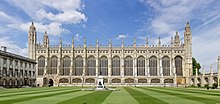
The Magnificat is a canticle, also known as the Song of Mary, the Canticle of Mary and, in the Byzantine tradition, the Ode of the Theotokos. It is traditionally incorporated into the liturgical services of the Catholic Church, the Eastern Orthodox Church, Lutheran Churches and the Anglican Communion. Its name comes from the incipit of the Latin version of the text.

Herbert Norman Howells was an English composer, organist, and teacher, most famous for his large output of Anglican church music.
Priory Records is a record company in the UK founded in 1980, and devoted mostly to church music and organ music. Important projects have included the complete Psalms sung by cathedral choirs to Anglican chant, all of the Magnificat and Nunc dimittis settings by Herbert Howells, the "British Church Composer Series", the "Choral and Music from English Cathedrals", the "Music for Evensong" and, more recently, all the hymns in the complete New English Hymnal Series. There are also three discs of the Communion Service settings of Stanford and four further discs featuring settings of the Te Deum and Jubilate.
In the context of Christian liturgy a canticle is a psalm-like song with biblical lyrics taken from elsewhere than the Book of Psalms, but included in psalters and books such as the breviary. Of special importance to the Divine Office are three New Testament Canticles that are the climaxes of the Offices of Lauds, Vespers and Compline; these are respectively Benedictus, Magnificat and Nunc dimittis. There are also a number of Canticles taken from the Old Testament.
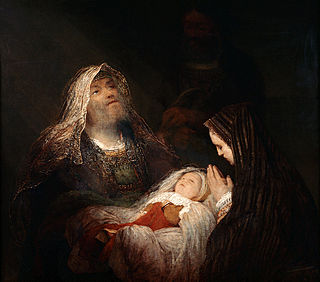
The Nunc dimittis, also known as the Song of Simeon or the Canticle of Simeon, is a canticle taken from the second chapter of the Gospel of Luke, verses 29 through 32. Its Latin name comes from its incipit, the opening words, of the Vulgate translation of the passage, meaning "Now you let depart". Since the 4th century it has been used in Christian services of evening worship such as Compline, Vespers, and Evensong.

Anglican church music is music that is written for Christian worship in Anglican religious services, forming part of the liturgy. It mostly consists of pieces written to be sung by a church choir, which may sing a cappella or accompanied by an organ.
In Anglican church music, a service is a musical setting of certain parts of the liturgy, generally for choir with or without organ accompaniment.
Herbert Whitton Sumsion was an English musician who was organist of Gloucester Cathedral from 1928 to 1967. Through his leadership role with the Three Choirs Festival, Sumsion maintained close associations with major figures in England's 20th-century musical renaissance, including Edward Elgar, Herbert Howells, Gerald Finzi, and Ralph Vaughan Williams. Although Sumsion is known primarily as a cathedral musician, his professional career spanned more than 60 years and encompassed composing, conducting, performing, accompanying, and teaching. His compositions include works for choir and organ, as well as lesser-known chamber and orchestral works.
Edward Woodall Naylor was an English organist and composer.
Robert Parsons was an English composer of the Tudor period who was active during the reigns of King Edward VI, Queen Mary I and Queen Elizabeth I. He is noted for his compositions of church music.

Sir Alfred Herbert Brewer was an English composer and organist. As organist of Gloucester Cathedral from 1896 until his death, he contributed a good deal to the Three Choirs Festival for 30 years.
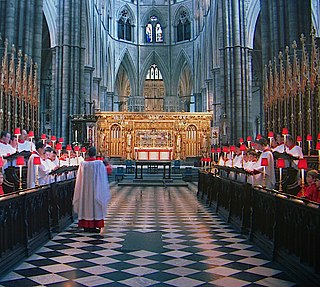
Evensong is a church service traditionally held near sunset focused on singing psalms and other biblical canticles. It is loosely based on the canonical hours of vespers and compline. Old English speakers translated the Latin word vesperas as æfensang, which became 'evensong' in modern English. Typically used in reference to the Anglican daily office's evening liturgy, it can also refer to the pre-Reformation form of vespers or services of evening prayer from other denominations, particularly within the Anglican Use of the Catholic Church.

Arvo Pärt's Nunc dimittis is a setting of the Latin canticle Nunc dimittis for mixed choir a cappella, written in 2001. It was published by Universal Edition.

The Magnificat and Nunc dimittis for St Paul's Cathedral, also known as the St Paul's Service, is a setting by the English composer Herbert Howells of the Magnificat and Nunc dimittis for the Anglican service of Evensong. Scored for four-part choir and organ, it was written in 1950 for St Paul's Cathedral in London.
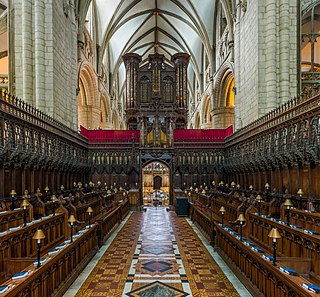
The Magnificat and Nunc dimittis for Gloucester Cathedral, also known as the Gloucester Service, is a setting by the English composer Herbert Howells of the Magnificat and Nunc dimittis for the Anglican service of Evensong. Scored for four-part choir and organ, it was written in 1946 for Gloucester Cathedral. It was published by Novello in 1947.

The Service in B-flat major, Op. 10, is a collection of Anglican church music by Charles Villiers Stanford for mixed choir and organ containing the canticles for each of the principal services of the Anglican Church. Stanford set the traditional liturgical texts in English in 1879 when he was the organist of Trinity College, Cambridge. They were published by Novello in 1902. Stanford orchestrated the work in 1903, with additional organ.

Magnificat and Nunc dimittis in D is a choral setting by the Irish composer Charles Wood of the Magnificat and Nunc dimittis for the Anglican service of Evening Prayer. Scored for four-part choir and organ, it was written in 1898. It is also known as Evening Service in D major.
The Daily Office in Anglican churches focuses the traditional canonical hours on daily services of Morning Prayer and Evening Prayer, usually following the Book of Common Prayer. As in other Christian traditions, either clergy or laity can lead the daily office. Most Anglican clergy are required to pray Morning and Evening Prayer daily.
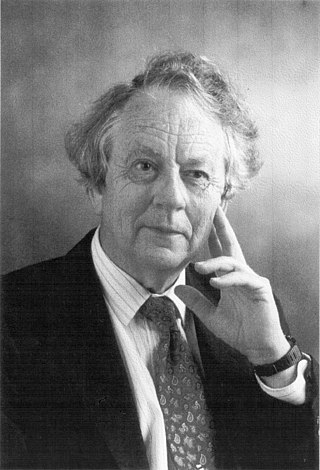
Gerald Mills Hendrie,, is an English scholar, composer, organist, pianist and harpsichordist.

